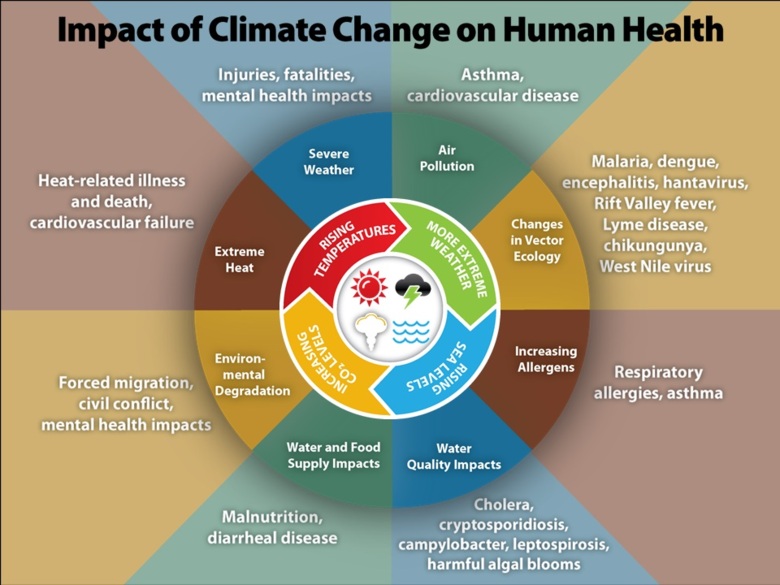Planetary Health
Climate change is the biggest threat to human health in this century; thus, our health depends on our environment. But unfortunately, our environment is changing and never before has the human environmental footprint on the planet been so large.
All environmental changes such as rising temperatures, sea level rise, extreme weather, and increasing CO2 levels affect our health both directly and indirectly by causing various diseases and injuries as well as nutritional deficiencies. In other words, everything is connected, and we must work together to meet these challenges by mitigating and adapting to these changes in our environment.

Klimat och hälsa - en kunskapssammanställning
This report, produced by the School of Public Health and Community Medicine at Sahlgrenska Academy, Institute of Medicine 2020, highlights measures that can reduce the risk of severe climate change while improving human health.
Hälsokonsekvenser av klimatförändring i Sverige – En risk- och sårbarhetsanalys
In this report from the Public Health Agency of Sweden 2021, health risks of climate change are presented in descending order of risk level. For each risk, health impacts, probability, vulnerability and capacity are presented.
The concept of planetary health
This year marks the 75th anniversary of the World Health Organization (WHO) and now the focus is not only on human health but also on the links between human health and well-being and the Earth's living and non-living ecosystems. The field is called planetary health and as a concept it is difficult to say when it first emerged. The relationship between planetary life systems and health was already being talked about in the 1970s, but it was not until 2015 that the concept of planetary health became widely recognised through the report “The Rockefeller Foundation-Lancet Commission on planetary health”, published in the scientific journal the Lancet. The history of the popularisation of the concept can be found in environmental activism and the holistic approach to health, but also in input from clinicians, academics, educators, civil society groups and progressive thinkers.
Planetary health is about: "The achievement of the highest attainable standard of health, wellbeing, and equity worldwide through judicious attention to the human systems - political, economic, and social - that shape the future of humanity and the Earth's natural systems that define the safe environmental limits within which humanity can flourish. Put simply, planetary health is the health of human civilisation and the state of the natural systems on which it depends". The Rockefeller Foundation-Lancet Commission on planetary health (2015).
Theme planetary health
NVS' first theme in our sustainable awareness year is planetary health. The reason for starting with planetary health is its close connection to all our work here at NVS, whether you work in teaching or research on different health issues. We have had the great pleasure and opportunity to interview four renowned and highly knowledgeable people in the field of planetary health and sustainable healthcare;
- Samuel Myers, MD, MPH, principal research scientist within Planetary Health, founding Director of the Planetary Health Alliance, Harvard School of Public Health
- Teddie Potter, registered nurse, clinical professor, co-founder of Health Professionals for a Healthy Climate, University of Minnesota
- Filip Maric, physiotherapist,associate professor, founder and Executive Chair of the Environmental Physiotherapy Association, The Arctic University of Norway
- Peter Stenvinkel, MD, professor, Karolinska Institutet
These researchers will tell you a bit about themselves and their fantastic work within sustainable development and then give their views on planetary health and how we here at NVS can start our work with sustainable development. They will also give you tips on links and articles that can be a good start to immerse yourself in the topic.
“You can´t have healthy people on a sick planet.”

